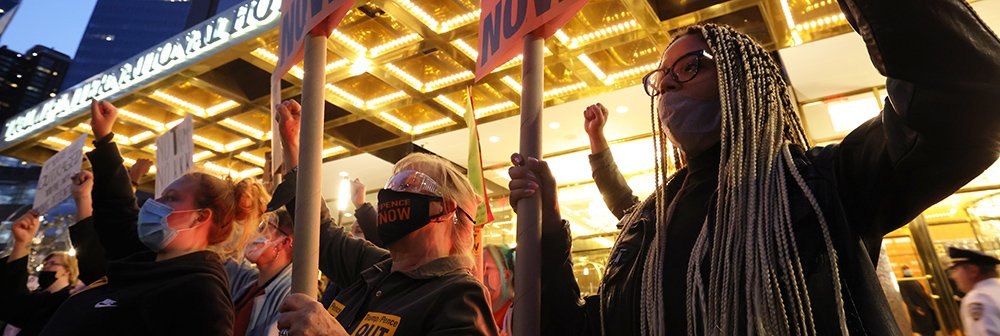Regardless of which candidate wins the presidential election, a substantial portion of Americans believe that there will be mass protests in the days and weeks following the election.
Data from the latest Economist/YouGov poll finds that among likely voters, 84% think it’s likely that there would be mass protests if Donald Trump wins the election. Just one in 11 (9%) believe it’s unlikely.
These figures are consistent across parties. Virtually the same percentage of Democrats (82%) and Republicans (83%) think it’s likely there will be protests if Trump is re-elected, and 85% of Independents agree.
If Joe Biden wins the election next week, it’s anyone’s guess what would happen: 45% think it’s likely there would be mass protests, but an identical number (45%) think it’s unlikely.
Among Biden’s own party, 47% foresee mass protests if he wins the election, while 40% disagree. Independents feel somewhat similarly, with 48% predicting protests and 45% saying it’s unlikely.
Republicans are slightly less likely (42%) than Democrats and Independents to believe there will be mass protests if Biden wins, but not by much. About half (49%) of this group thinks it’s unlikely there would be mass protests if Biden were to win the 2020 presidential election.
Beyond the immediate aftermath of the election, some voters also have doubts about whether there will be a peaceful transition of power in January if Biden wins. Most (54%) likely voters say it is likely that there would be a peaceful transition of power, but 35% think it’s unlikely. Republicans (62%) are more likely than Independents (54%) and Democrats (43%) to predict a peaceful transition of power in the event that Biden is victorious.
Related: Most voters think Russia, China and Iran are trying to influence the election
See the toplines and crosstabs from this week’s Economist/YouGov Poll
Methodology: The Economist survey was conducted by YouGov using a nationally representative sample of 1,500 registered voters interviewed online between October 25 - 27, 2020. This sample was weighted according to gender, age, race, and education based on the American Community Survey, conducted by the US Bureau of the Census, as well as 2016 Presidential vote, registration status, geographic region, and news interest. Respondents were selected from YouGov’s opt-in panel to be representative of all US citizens. The margin of error is approximately 3.1% for the overall sample.
Image: Getty










